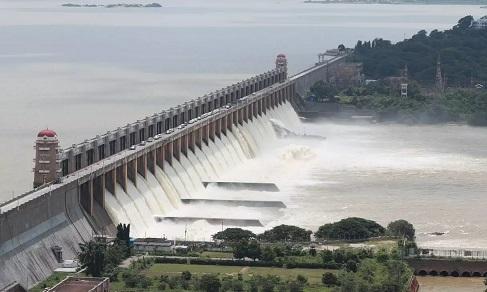
Andhra Pradesh’s Minister for Water Resources Nimmala Ramanaidu reached Tungabhadra dam in Karnataka on Monday to review the situation arising out of the washing away of one of the crest gates.
He assessed the restoration work taken up at the dam at Hospet in Vijayanagara District in Karnataka.
The minister spoke to engineers and experts on installation of a new gate.
The minister was accompanied by the Special Chief Secretary and Engineer-in-Chief.
Earlier, a team of experts from Andhra Pradesh called on the dam engineers and discussed the temporary arrangement made at the point where the gate was washed away and the efforts to install a new gate.
The team, led by Design Department Chief Engineer T Kumar, includes Superintending Engineer Shiva Kumar Reddy and Executive Engineer Venugopal Reddy.
The 19th gate of the Tungabhadra Dam was washed away on the night of August 10.
The incident occurred when the crest gates were being closed due to the receding flood level in the reservoir.
Following the incident, all 33 crest gates had to be opened to reduce the pressure on the broken gate.
The discharge of water reached one lakh cusecs on Sunday.
The Andhra Pradesh government sounded floor alert in low-lying areas in united Kurnool District.
The dam authorities immediately issued an alert asking the people not to venture into the river downstream.
Minister Ramanaidu said the Collectors of the districts concerned were asked to alert the people. He said people of Kowthalam, Kosigi, Mantralayam and Nandavaram mandal were alerted.
Authorities at Srisailam, Nagarjuna Sagar and Pulichintala projects were also directed to remain alert.
According to engineers, restoration work could commence only after there is 60 tmc of water.
As Srisailam, Nagarjuna Sagar and Pulichintala projects were already nearly full and their gates were opened due to huge inflows from upstream, the flood water due to the washing away of the crest gate at Tungabhadra is going waste into the sea.
This is said to be the first such incident at Tungabhadra in the last 70 years.
The dam meets drinking and irrigation water needs of Karnataka, Rayalaseema region of Andhra Pradesh and Telangana.











